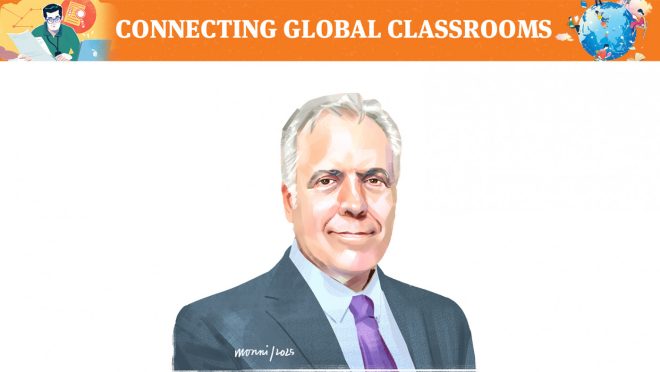'A Bangladeshi university must be global in vision and local at heart'
'A Bangladeshi university must be global in vision and local at heart'

Having spent years in higher education across multiple regions—from Canada to Asia—I have witnessed firsthand how global education systems are continuously evolving, yet remain deeply rooted in traditions that go back centuries. The foundation of modern higher education traces back some 1,100 years to the Oxbridge model in the United Kingdom. Over time, this evolved into the American system, which has now spread worldwide, influencing universities from Singapore to Dhaka.
Today, the question we must ask is: are we building a Bangladeshi university, or are we creating a Western-style university in Bangladesh? Or perhaps, something in between?
At Independent University, Bangladesh (IUB), my focus lies in exploring how a Western-style education system—emphasising critical thinking, research, and innovation—can effectively function within the rich local culture of Bangladesh. Each university must find its own balance between global comparability and local relevance. To be recognised internationally, universities must meet global standards of accreditation and ranking criteria. Yet, we must also ensure our educational practices remain grounded in local needs and realities.
For our students to thrive internationally, our universities too must be recognised internationally. This requires commitment, diligence, and collaboration across the higher education sector. The more we align with international standards while retaining our unique cultural identity, the better we can prepare Bangladeshi students for global success.
Understanding student culture
Having worked in various countries, I have observed that while every nation claims to have a unique academic culture, human behaviour in classrooms is remarkably consistent worldwide. In every country, the students who sit in the front rows are often the most engaged and achieve the highest grades. Those in the back tend to be less so. Participation, curiosity, and discipline—these qualities transcend borders.
In my six months at IUB, I have found Bangladeshi students to be some of the most intellectually curious I have encountered. They are polite yet fearless in asking questions, eager to discuss ideas, and thoughtful in their reasoning. This openness to inquiry is a tremendous asset. It reflects a generation that is not afraid to think critically, which is essential in the modern world.
Building regional and global bridges
While many universities in Bangladesh aspire to form partnerships with institutions in the US, UK, Canada, and Australia, I believe it is equally important to strengthen ties within our own region—the Bay of Bengal area and beyond. There are dynamic education systems developing north and south of Bangladesh, offering opportunities for collaboration, research exchange, and regional mobility.
At the same time, Bangladeshi private universities must collectively promote themselves on the global stage. The quality of education here, especially at top-tier institutions, is far better than is often recognised internationally. By working together, universities can position Bangladesh as a genuine destination for international students, not just as a source of talent.
Rethinking teaching and evaluation
Another ongoing discussion in academia concerns assessment. In Western systems, much of the learning is activity-based—through projects, discussions, and continuous evaluation—whereas in South Asia, exam-based systems dominate. The University Grants Commission (UGC) provides broad guidelines, but there is room for flexibility and innovation.
Different disciplines require different approaches. For instance, literature or philosophy may benefit more from discussions and analytical writing, while finance or engineering may require more structured evaluations. What matters most is that students learn to apply their knowledge, not merely reproduce it in an exam.
Education must serve both intellectual and practical goals. While universities should cultivate knowledge for its own sake, they must also prepare students for the realities of the job market. I often remind students that a degree alone does not guarantee employment; what matters equally are skills, confidence, and adaptability.
Beyond academics: preparing for the real world
At IUB, we are investing in strengthening our alumni network under the Pro Vice-Chancellor’s office. Alumni are not just former students—they are ambassadors, mentors, employers, and lifelong members of the university community. Keeping them engaged benefits both sides: universities gain mentors and advocates, while alumni maintain valuable professional connections and pride in their institution.
Moreover, universities must help students develop what are often called “soft skills.” Personally, I find the term misleading—there is nothing “soft” about these abilities. Communication, confidence, professionalism, and empathy are as vital as technical knowledge. Employers often make up their minds within seconds of meeting a candidate; how students present themselves, speak, and listen can determine their success as much as their GPA.
From the first year to graduation, students should receive continuous preparation for the professional world—how to interview, how to communicate, how to collaborate. These are not side lessons; they are central to modern education.
Bangladesh’s higher education system has come a long way. Our students are intelligent, creative, and globally aware. Many already succeed abroad in graduate programmes and professional fields. Yet, we can do more to create structured pathways for outstanding students to gain international exposure and opportunities. This not only benefits them individually but also enhances the country’s reputation globally.
Ultimately, education is not about choosing between local and global—it is about blending both. A truly modern Bangladeshi university must be rooted in local values while open to global ideas. If we can achieve that balance, we will not only prepare our students for the world—we will also bring the world closer to Bangladesh.


